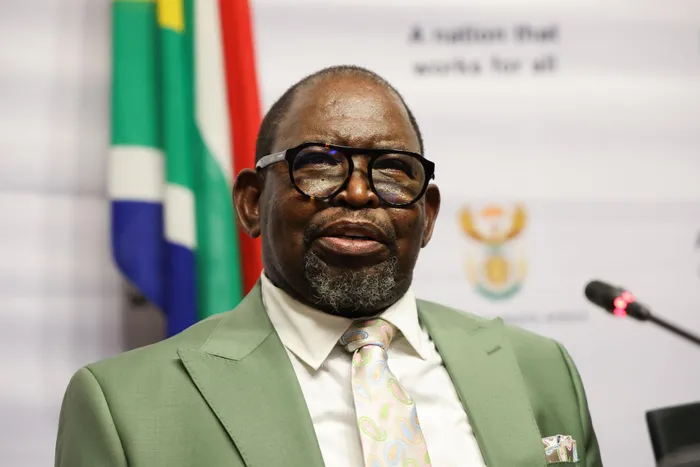FCC urges Treasury to seize opportunity to restructure debt as bond yields fall
PARLIAMENT

Finance Minister Enoch Godongwana tabled the 2025 Medium Term Budget Policy Statement (MTBPS) last week. FCC chairperson Dr Patience Nombeko Mvaba noted that the MTBPS projects a primary budget surplus of 2.5% of GDP by 2028/29, but warned that the outlook is fragile.
Image: Supplied
Banele Ginindza
The Financial and Fiscal Commission( FFC) has urged National Treasury to urgently pursue proactive debt restructuring, arguing that South Africa is missing a rare window of opportunity created by sharply lower government bond yields.
Briefing Parliament on the recently tabled Medium-Term Budget Policy Statement (MTBPS), FCC head of research Chen-Wei Tseng said the yield on the 10-year government bond has dropped from a peak of 11% to 8.67%.
He said this signals that investors now perceive lower sovereign risk, and that government could potentially refinance its debt at a significantly lower cost.
Chen-Wei said Treasury could now possibly borrow the same amount as before but costing less, however, warned that such savings do not materialise automatically.
"But it does not happen automatically. It needs active market engagement. It's not an easy job," he said.
"There are indications of inaction to restructure the debt despite the better-than-expected revenue collection, despite the low inflation, despite the credit rating outlook and the lower bond yield required. Under these conditions, we should seek a lower stabilising level not higher."
Chen-Wei said the MTBPS’s higher projected debt-stabilisation levels suggested “someone is being lazy”.
"If we act appropriately, proactively restructure the debt and make sure that we use the opportunity amongst the many crises we just came out of, we may then turn this around as we are already in a debt spiral, a debt crises," he said.
"We have been borrowing money to spend more than actually what our revenue has allowed us to when collected."
FCC chairperson Dr Patience Nombeko Mbava criticised government’s decision to use the R20 billion revenue surplus to fund projects such as Parliament’s rebuilding and additional resourcing for the Electoral Commission of South Africa (IEC) ahead of next year’s municipal elections.
Mbava argued that such spending undermines the purpose of running a primary budget surplus, which is to reduce debt as debt-service costs erode that surplus.
"What needs to happen is debt-service costs need to be reduced and not mushroom so that the debt-service over time can actually remove the debt completely. In this budget, we have achieved some positive fiscal outcomes and we are projecting about R19.7bn in tax revenue, but we are saying that positive windfall will be used to prioritise some key spending items in the budget and increase contingency reserves," she said.
"So we are not actually using the surplus to reduce the debt. It's important that for the debt to be reduced. We must rely on the macroeconomic environment to be favourable, but the actual surplus is being used to reduce the debt. To deal with pressing issues, which are the building of Parliament, funding of the IEC for the next elections are important issues, but the point is that to actually deal with debt, we need to reign in outstanding debt."
Mbava noted that the MTBPS projects a primary budget surplus of 2.5% of GDP by 2028/29, but warned that the outlook is fragile.
"Anything can happen from now to 2028 to upset the apple cart. We are treading a very thin line. It's possible that the forecast might never happen, anything can come up to demand more spending from the fiscal envelope. We should contain the current debt," she said.
Responding to questions about whether fiscal consolidation had weighed down investment and productivity since 2011, Mbava reiterated the FCC’s view that consolidation never actually happened.
She added that institutional failures, particularly at State-Owned Enterprises, have fuelled the weak fiscal position through repeated bailouts and declining service delivery.
The FCC said proactive debt management should include bond buybacks and issuing new bonds at lower rates. To do this effectively, Treasury would need to work closely with Sarb, which can purchase existing government bonds in the secondary market.
Such coordination would remain consistent with Sarb’s constitutional mandate, the FCC argued, and would signal to investors that government is taking credible steps to reduce borrowing costs and refinancing risks.
"The goal of this approach is to smooth the debt redemption schedule and profile with the annual debt burden freeing the fiscal space," the FCC said.
"There will be risks if negotiations are handled poorly as can be seen as a sign of distress however the potential benefits are strong as it will provide immediate fiscal relief and free up resources and reduce solvency risks."
BUSINESS REPORT